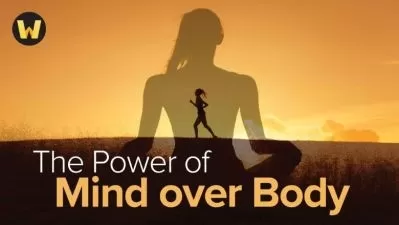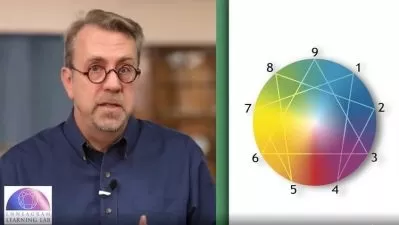Outsmart Yourself: Brain-Based Strategies to a Better You
Peter M. Vishton
12:37:22
Description
What if you aren’t as in control of your actions as you think you are? What if your subconscious is driving your decisions without your approval? Is there a way to “hack” your brain to perform better, live healthier, and break your bad habits? We all can think of things about ourselves we’d like to change, but as neuroscientists are coming to realize, changing our behaviors isn’t as straightforward as you might think. Many of our everyday decisions are rooted in the subconscious, which means we have to “outsmart” our own brains to see results.
Outsmart Yourself: Brain-Based Strategies to a Better You will give you insights into how your mind works and the tools you need to make lasting change. Taught by Professor Peter M. Vishton, Associate Professor of Psychology at William & Mary, these 24 exciting lectures give you a wealth of practical strategies for enhancing your thinking and improving your well-being. You’ll see how the subconscious guides much of our behavior, leading to a kind of autopilot through much of life, including when it comes to making important decisions.
The brain is an amazing instrument, and neuroscientists today have more information than ever about how it works—as well as strategies for helping us live better every day. The surprising thing is just how counterintuitive some of these strategies can be. For instance, the best way to combat procrastination is often to…do nothing for 20 minutes. By forcing yourself to do nothing, you won’t get caught up in time-sucking avoidance behaviors like checking email. After 20 minutes, you’ll find yourself focused and ready to get to work.
Neuroscientists have stumbled onto countless insights for living better, many of which go against the grain of what you might think you know. Examine why exercise is less helpful for weight-loss than we had previously believed (but is valuable in other ways), why talent is an overrated predictor of success, how the effects of mindfulness meditation have benefited us since our hunter-gatherer days, what procrastination can do for your creativity, and more.
Whether we’re distracted by too many tasks, being influenced by crafty marketers, or simply living in a rut of bad habits, our conscious brains aren’t always guiding us toward the best actions. Fortunately, Professor Vishton offers the latest in scientific research to outsmart the automatic workings of your brain. Outsmart Yourself: Brain-Based Strategies to a Better You empowers you take charge of your life and harness your brain’s full potential.
Uncover Evidence-Based ‘Hacks’ For Your Brain
One common misconception is that we only use 10 percent of our brains. In fact, Professor Vishton explains, it’s clear that we use much more than that, but we may only understand 10 percent of our brains. The good news is that recent years have seen an explosion of knowledge about the brain, and with that knowledge comes new opportunities to perform better. One key theme running through Outsmart Yourself: Brain-Based Strategies to a Better You is that a few simple practices really can offer dramatic results in our performance, creativity, physical health, and mental well-being.
From the myth of multitasking to the mechanisms behind falling—and staying—in love, Professor Vishton shows you what is happening inside your brain, which will help you achieve your goals like never before.
- Improve Your Physical, Mental, and Emotional Health: Curb your unhealthy snacking, unlearn your phobias, improve mindfulness, and combat depression. These things are easier said than done, but brain-based strategies for living healthfully offer immeasurable dividends.
- Master the Mental Game: Researchers have discovered that simply imagining yourself performing an exercise can make as big an impact on your strength as physical practice. From how language shapes your brain to the practice of “monotasking,” encounter ways to improve your performance.
- Hone the Subtle Art of Persuasion: Learn the tricks of the salesperson’s trade, from after-dinner mints at a restaurant to the pricing strategy at your local watering hole. Researching the art of persuasion will empower you in your negotiations and make you a savvier consumer.
- Uncover the Key to Happiness: If money doesn’t buy happiness, where do you turn for a fulfilling life? Based on longevity studies, see why valuing your time and deepening your friendships might be the most important thing you can do for yourself.
Build a Toolkit of Strategies for Better Living
When you complete this course, you will have an abundant list of practical, everyday ways to strengthen your creativity, improve your problem-solving, enhance your health, and generally operate on a higher level:
- Examine why keeping a notebook might be the easiest way to shake bad habits such as biting your fingernails.
- Delve into the psychology of anger and emotional mirroring, which will help you better diffuse interpersonal tensions.
- Perform a bit of time travel to outsmart your “present self” to make life better for your “future self.”
- Consider eating fermented foods next time you feel the blues and need an emotional pick-me-up.
- If you want to boost your creativity, try taking a walk—preferably in a nice outdoor green space.
These are just a few of the many tips and strategies Professor Vishton offers to help you overcome your brain’s hardwiring.
In each lecture, he backs up each of his strategies with evidence from psychological studies and the recent discoveries in the field of neuroscience. You’ll explore some of the classic experiments in psychology, from John Watson’s behaviorism to Stanley Milgram’s obedience studies. Thanks to research with EEGs, fMRIs, and other technologies, you’ll go inside the brain to find out how our neurochemistry drives our behaviors—and what we can do about it.
Participate in Each Lecture
One thing that makes this course so unique is that not only do you walk away with practical tips, you also get the chance to put these tips into practice during the lectures. How do you use a five-gallon and a three-gallon jug to measure out exactly four gallons? How do you connect two ropes hanging from the ceiling if they’re more than an arm’s width apart? Professor Vishton gives you ample opportunities to test your creativity and problem-solving skills with engaging puzzles, brainteasers, word games, and more. These mental calisthenics are sure to get your neurons fired up.
Whether you are looking for a mental stimulus or want increased clarity for the challenges of everyday life, Outsmart Yourself: Brain-Based Strategies to a Better You offers a satisfying blend of theoretical knowledge and practical know-how to help you jumpstart a more productive and fulfilling life.
More details
User Reviews
Rating
Peter M. Vishton
Instructor's Courses
The Great Courses
View courses The Great Courses- language english
- Training sessions 24
- duration 12:37:22
- English subtitles has
- Release Date 2023/04/29






























